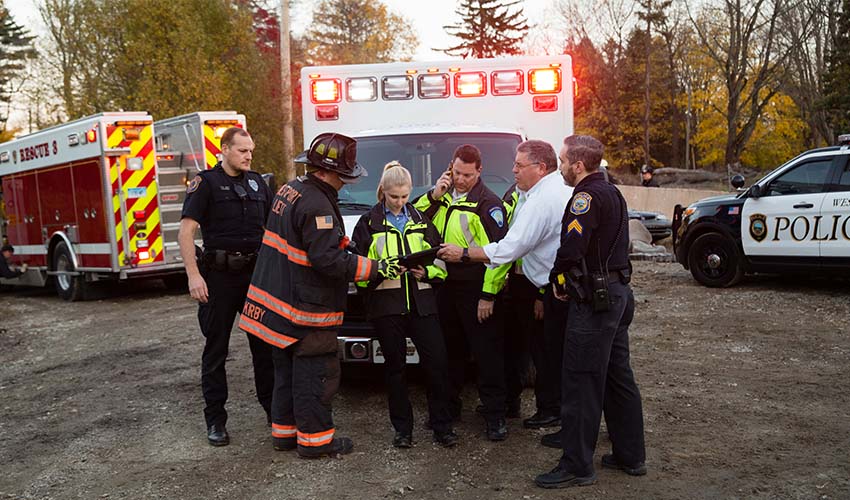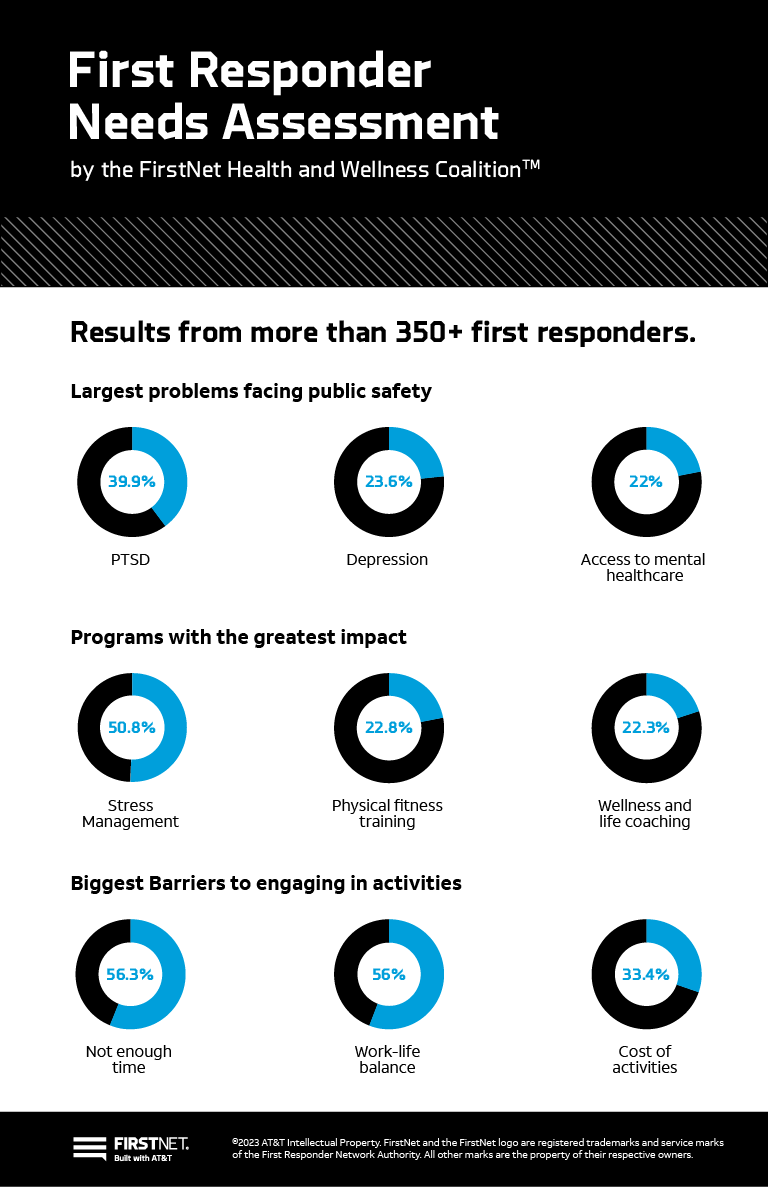FirstNet Health and Wellness Coalition and the emergency responder community identify recommendations that will evolve public safety’s approach to wellness.

Key Takeaways:
- Bringing together emergency responders across disciplines, Helping the Helpers addresses key issues that affect health and wellness implementation for emergency responder organizations.
- These recommendations are based on feedback from emergency responders across the country and focus on how to best engage the public safety community.
What’s the news? FirstNet®, Built with AT&T and the FirstNet Health and Wellness Coalition™ (FNHWC) have identified the major barriers to mental health program adoption among first responder agencies and developed 5 key recommendations to improve the health and wellness of public safety in the new white paper, Helping the Helpers: Lessons Learned and Outcomes to Date from the FirstNet Health and Wellness Coalition.
Based on lessons learned from FNHWC in its first 3 years and feedback from emergency responders around the country, the white paper establishes tangible next steps to better implement health and wellness programs and lays the foundation for public safety legislative advocacy going forward.
What are the recommendations? The issues facing our first responders are complex and don’t have a “one size fits all” solution. Endorsed by more than 2 dozen public safety organizations and over 40 collaborators, the 5 recommendations target all levels of cultural change and are based on responses gathered from the FirstNet Needs Assessment Survey and a body of evidence-supported strategies. These include:
- Deepening leadership engagement and equipping them with the skills to help all levels of responders see value in training and lifestyle changes through leadership modeling health and wellness behaviors and regularly reinforcing the importance of these practices to their department.
- Integrating wellness education into training from the time responders are at the academy through retirement. Instead of being considered an added benefit, wellness programs need to be woven into the fabric of responders’ daily lives and their career progression.
- Allocating dedicated funding and resources to implement evidence-based solutions from agencies, both local and national, to create systematic changes. While grants fill a huge void in funding resources, they are not enough.
- Defining national wellness standards on evidence-based health and wellness programs and provide access to technical assistance centers to provide additional services for responders.
- Better communications between national and local first responder agencies and from leadership to share best practices to encourage health and wellness opportunities.
Why is this important? Compared to the general population, first responders, including police, fire, emergency telecommunicators, emergency management, frontline healthcare personnel and others, experience higher rates of depression, post-traumatic stress, burnout, anxiety and other issues1 that can lead to secondary or tertiary health risks like cardiovascular disease, cancer, or disordered sleep.
- For law enforcement, there is a more than 20-year difference in life expectancy compared to the average American male.2
- It’s estimated that 20-25% of all first responders experience post-traumatic stress.3
- Death by suicide in this group often outnumbers traditional line-of-duty deaths.4
- Nurses and other frontline healthcare personnel have long been at an increased risk of suicide than the general population.5
First Responder Needs Assessment by the FirstNet Health and Wellness Coalition
What is the FNWHC? Through its work with public safety, leadership at FirstNet—the only nationwide communications network built with and for public safety—recognized the need to dedicate resources towards first responder mental health. Established by AT&T in 2020, the FNHWC brings together over 2 dozen national safety organizations representing more than 5.1 million first responders across disciplines like fire, police, EMS, 9-1-1 and emergency response to assess, plan, integrate and evaluate strategies and solutions that support first responder wellness.
What are people saying?
“As a former critical care nurse, I have seen firsthand the impact mental health programming can have on individual responders and a department’s culture. Time, investment and collaboration between first responders, leadership and government agencies will create more resilient communities. FirstNet and the Coalition are proud to be a part of an initiative that helps our helpers and save lives.”
Dr. Anna Courie
Director of Responder Wellness, FirstNet Program at AT&T
“With their white paper, FirstNet has captured the importance of placing the health and wellness of our nation’s first responders front and center. The FirstNet Health and Wellness Coalition has brought together stakeholders from all the first responder disciplines, helping to streamline the work of supporting those who keep us safe.”
Sherri Martin
National Director of Wellness Services, Fraternal Order of Police
“Mental health and wellness are critically important for the future of first responders everywhere. It is imperative that we break down the stigma associated with seeking help and resources which help us build better people after trauma and struggle. Only by openly talking about these issues and creating a ‘new normal’ for mental health struggles will we accomplish this.”
Chief Paco Balderrama
Chief of Police, Fresno Police Department
“The Helping the Helpers white paper will greatly benefit America’s 9-1-1 professionals, who are the first first responders on a scene, by creating a culture of better health and wellness.”
April Heinze
Director of 9-1-1 and PSAP Operations at NENA: The 9-1-1 Association
“Having been involved in public safety for over thirty years, I firmly believe this is one of the most significant advancements in the overall health of first responders. I hope we continue to see growth from this project and ensure that our partners will continue to have productive careers and retirements as well.”
Rich Martin
Deputy Chief, Castle Rock Fire and Rescue Department
“Helping the Helpers is a pivotal milestone for all emergency personnel, leveraging research and data that demonstrates our need for support and creating a pathway to make critical improvements to public safety wellness.”
Carrie Speranza
CEM, 2nd Vice President of IAEM, Director of Emergency Management Solutions at Esri
“I am extremely proud of this work to support first responders, in particular, the consideration given for their health and wellness. First responders, including nurses and other health care professionals, answer the call to communities’ emergencies and disasters, tirelessly protecting the public’s health and safety. This program is crucial for these brave members of society who serve on the frontlines to feel protected and supported. On behalf of ANA, we champion and recognize the FirstNet Program as a valuable resource.”
Jennifer Mensik Kennedy
PhD, MBA, RN, NEA-BC, FAAN, ANA President
“The work the FNHWC does for responders is significant to the law enforcement profession as keeping officers healthy is paramount to creating safe communities. As the past president of NAWLEE, I have spoken to agencies from across the county that know this is a priority. Tools and resources will help agencies develop the best policies and implement strategies that will enhance the wellness and resiliency of responders.”
Chief Shannon Trump
Indiana University Health Department of Public Safety
PR Archives: Latest, By Company, By Date
